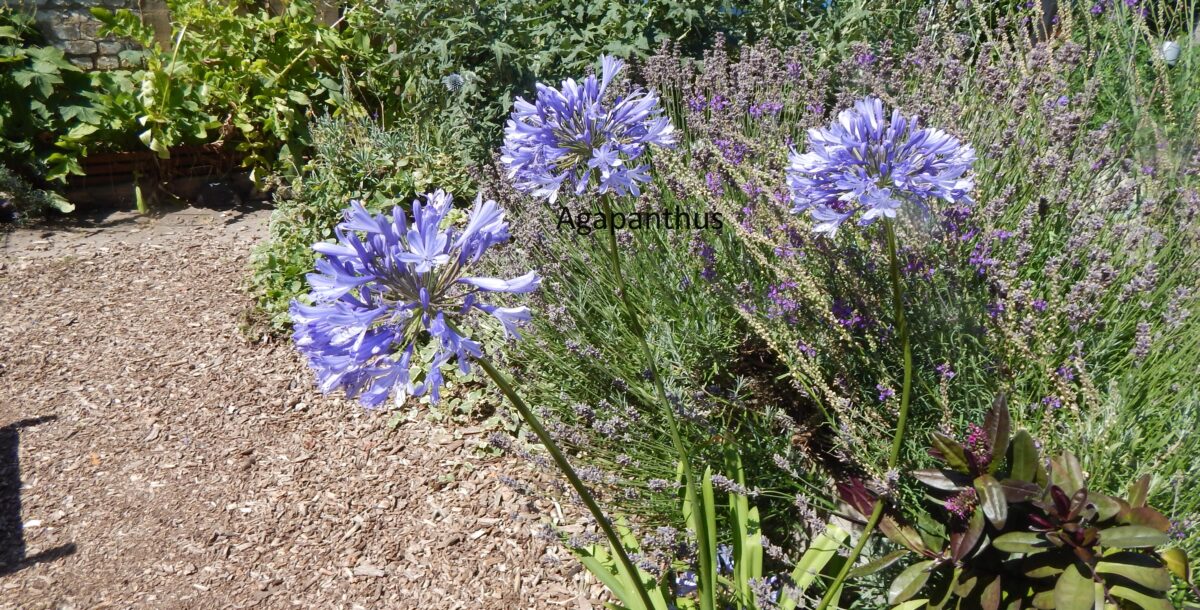It’s the days of late-flowering summer plants: two agapanthus, a white and a blue, with large globular flowers, and hollyhocks around the garden, lots of yellows, some pink. And there’s fruit, a reminder that we are heading for autumn: clusters of green plums in the small fruit tree by the vegetable beds, nearby, in the pergola, the vine is awash with tiny grapes, a precursor to Chateau Earlham.
The summer has been wet and warm, on other days a little cool. An English woman living in New York says she yearns for cool, wet British summers as she swelters in east coast heat. Which makes me reckon that in twenty years, we’ll yearn for the cool summers of the mid 20s. Climate change has us firmly in its grip; we cannot assuage our fossil fuel fever. Old habits keep us flying and driving, as if our tiny contribution is of no accord. Multiply that by 30 millionfold.
I was sent information that the Zero Emission Network (ZEN) were offering a number of grants of £2500 towards cargo bikes. ZEN is doing this after a successful bid to the Mayor of London’s Air Quality Fund, a reminder that fossil fuels pollute as well as heat up the globe. A cargo bike seemed a good idea for the garden. They are bikes for carrying loads, though sometimes children. The sort we would go for would be a three-wheeler with a large bucket, at the front or at the back, for carrying whatever the garden wanted transported. I asked the opinion of other volunteers. Most were excited at the possibility, but said little about usage. There was concern about storage, though I felt the trike could be kept overnight in the container and taken out first thing, the container being 8 feet wide and a cargo trike around 4 feet. Yes, we’d have to make room… Not everyone was so sure. As for getting the hang of riding a cargo bike, ZEN offers training, and even loan of bikes so, if we got the grant, we could try out a few.
But, after my initial enthusiasm, I began to have doubts. Fine to imagine cycling round Forest Gate with our name and colours on the side, but doing what? I considered my own fetching and carryings for the garden. I use wheelbarrows to cart things around locally, including seven hefty sand bags to and from the Forest Gate Festival. I have carted tools and watering cans, again by wheelbarrow. I have never gone far enough to justify using a cargo bike, and I suspect it is likely to be the same for most other volunteers. So for that main reason, lack of usage, I thought there’s no point applying for a cargo bike. To do so, I would have to exaggerate hugely how much we would use it. Inflate that so much, it would amount to lying, and then, if we got it, watch it gather cobwebs.
An idea hits the dust, shot down by the arrows of realism.
There’s lots of wild carrot in the wildflower bed, a little hedge mustard, a few California poppies, tired corn marigolds, but much of its June glory has gone. Though, there are still wildflowers about. I did the last of my wildflower rambles last Sunday. Starting from the garden, we ambled along Earlham Grove, seeing what was growing out of the pavement and at the foot of the plane trees.
We crossed the footbridge over the railway, and on to Forest Lane Park. There are four large beds of wildflowers in the park. I am sure some people hate them. (‘Weeds, nothing but weeds!’). That dismissive epithet was not for us wildflower enthusiasts. In and around the large pond in the park, there were bulrushes, purple loosestrife, willow herb and two swans.
We left the park by the back entrance, and ambled on to West Ham cemetery. Fortunately, the cemetery is not too manicured, so there was lots of hawkweed, daisies, buttercups, yarrow, birds-foot trefoil, herb robert, dandelion, red and white clover, and mallow between the gravestones. There were seven of us on this last ramble. The best of the rambles, I thought. Forest Lane Park has an interesting history as the site for a workhouse, which became a mother’s hospital, while cemeteries are quiet places that remind us of our mortality.

